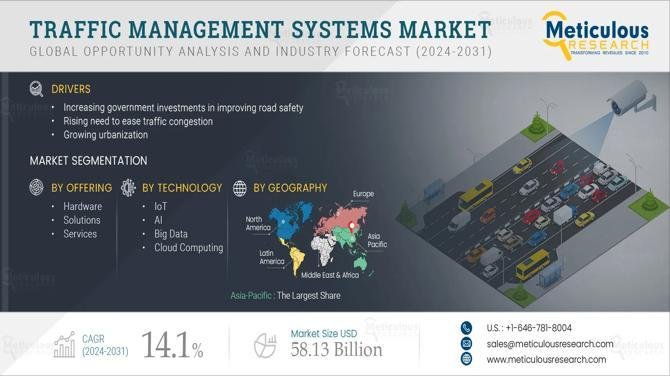Meticulous Research®, a leading global market research firm, has released a research report titled ‘Traffic Management Systems Market by Offering (Hardware (Sensors, Cameras, Others), Solutions (Traffic Monitoring, Remote Enforcement, Others), Services), Deployment (Cloud, On-premise), Technology (IoT, AI, Others), and Geography — Forecasts to 2031’.
According to Meticulous Research®’s most recent publication, the traffic management systems market is expected to reach $58.13 billion by 2031, growing at a 14.1% CAGR between 2024 and 2031. The traffic management systems market is expanding due to increased government investments in road safety, a growing demand to alleviate traffic congestion, and increased urbanization. However, the high capital and maintenance expenses of traffic management systems limit the market’s growth potential.
Key Technological Trends Shaping Traffic Management Systems
Cutting-edge innovation is changing the way cities approach traffic management and urban mobility. AI, cloud computing, the Internet of Things (IoT), big data analytics, and edge computing are at the heart of modern TMS. These technologies combine to change traffic from a reactive, analog process to a dynamic, predictive, and adaptive system.
Connected sensors embedded in roads, cameras stationed at intersections, and vehicle telematics all input vast amounts of data in real time. AI and machine learning systems use this data to predict congestion, alter traffic signals, and spot events significantly more efficiently than previous models. Edge computing allows data to be managed locally for lightning-fast response times, while integrated communication networks ensure that traffic controllers, emergency services, and even self-driving vehicles are always linked.
AI Integration: The Game Changer
AI integration has resulted in a significant improvement in TMS performance. Modern systems monitor real-time video feeds, weather, event calendars, and even social media updates, as opposed to preset schedules and basic detection cycles in the past. AI algorithms understand congestion patterns, predict peak hours, and respond to events in seconds.
This intelligence improves traffic flow by decreasing stop-and-go movements, which contribute to greater emissions and wasted fuel. Advanced solutions can adjust traffic light cycles, prioritize public transportation vehicles, and quickly reroute traffic following an accident. In certain forward-thinking cities, AI-powered predictive analytics work in tandem with ride-hailing fleets and delivery drones to optimize mobility throughout the urban landscape.
The Rise of Cloud-Based Traffic Management Systems
Cloud computing has revolutionized TMS since it is more scalable, versatile, and cost-effective than on-premises options. Because cloud-based solutions enable cities to process large amounts of data from several sources centrally, they do away with the need for expensive, locally based IT equipment at every intersection or control center.
This makes it easy to spread new features and improvements, ensuring that towns have access to the newest technology. Long-term urban planning and continuous system development are supported by the thorough research made possible by cloud-based archiving of historical data. Furthermore, cloud technologies speed up innovation and information sharing by facilitating cooperation between cities, government organizations, and business sector partners.
Regions with the Highest Expected Growth
The Asia-Pacific area is becoming the market with the quickest rate of growth, even if Europe and North America still have a dominant position in the deployment of advanced TMS. Growing metropolitan populations and severe traffic problems are driving cities in China, India, Japan, Singapore, and Indonesia to invest in extensive TMS deployment. Advanced systems are being implemented quickly because to ambitious smart city projects, substantial government funding, and a desire to outperform antiquated infrastructure.
Due to increased urbanization and government programs aimed at enhancing urban mobility, safety, and air quality, the Middle East, as well as parts of Latin America and Africa, is catching up.
Urbanization and the Demand for Advanced Solutions
Urbanization itself is arguably the most important factor propelling TMS innovation. It is estimated that 70% of people on Earth will live in cities by 2050. As a result of this demographic shift, there are more cars on the road, transportation needs are more complicated, and residents have increased expectations for sustainable, safe, and easy mobility around cities.
Communities must therefore better utilize their current infrastructure rather than relying on new freeways. In addition to reducing traffic, advanced TMS also improves millions of people’s quality of life, reduces environmental impact, and speeds up emergency response times. Bicycles, trains, buses, and even pedestrian traffic are all part of integrated mobility, which is made possible by intelligent, networked technologies.
Key Players:
Some of the key players operating in the traffic management systems market are IBM Corporation (U.S.), Johnson Controls International plc (Ireland), TomTom N.V. (Netherlands), Q-Free ASA (Norway), Indra Sistemas, S.A. (Spain), Cisco Systems, Inc. (U.S.), Huawei Investment & Holding Co., Ltd. (China), Cubic Corporation (U.S.), Yunex GmbH (Germany), Oriux (U.S.), Kapsch TrafficCom AG (Austria), SWARCO AG (Austria), TransCore (U.S.), Teledyne FLIR LLC (U.S.), PTV Planung Transport Verkehr GmbH (Germany), Chevron Traffic Management Limited (U.K.), Onnyx Electronisys Pvt. Ltd. (India), Miovision Technologies Incorporated (Canada), Econolite Group, Inc. (U.S.), and Bercman Technologies AS (Estonia).
In summary:
The future of traffic management is intelligent, adaptable, and interconnected. Artificial intelligence, cloud computing, and big data analytics are transforming urban transportation, making streets safer and more efficient. As urbanization accelerates, the demand for such advanced solutions will only grow, cementing TMS as a cornerstone of smart, livable cities for years to come.
Download Sample Report Here @ https://www.meticulousresearch.com/download-sample-report/cp_id=5672
Contact Us:
Meticulous Research®
Email- sales@meticulousresearch.com
Contact Sales- +1–646–781–8004
Connect with us on LinkedIn- https://www.linkedin.com/company/meticulous-research
